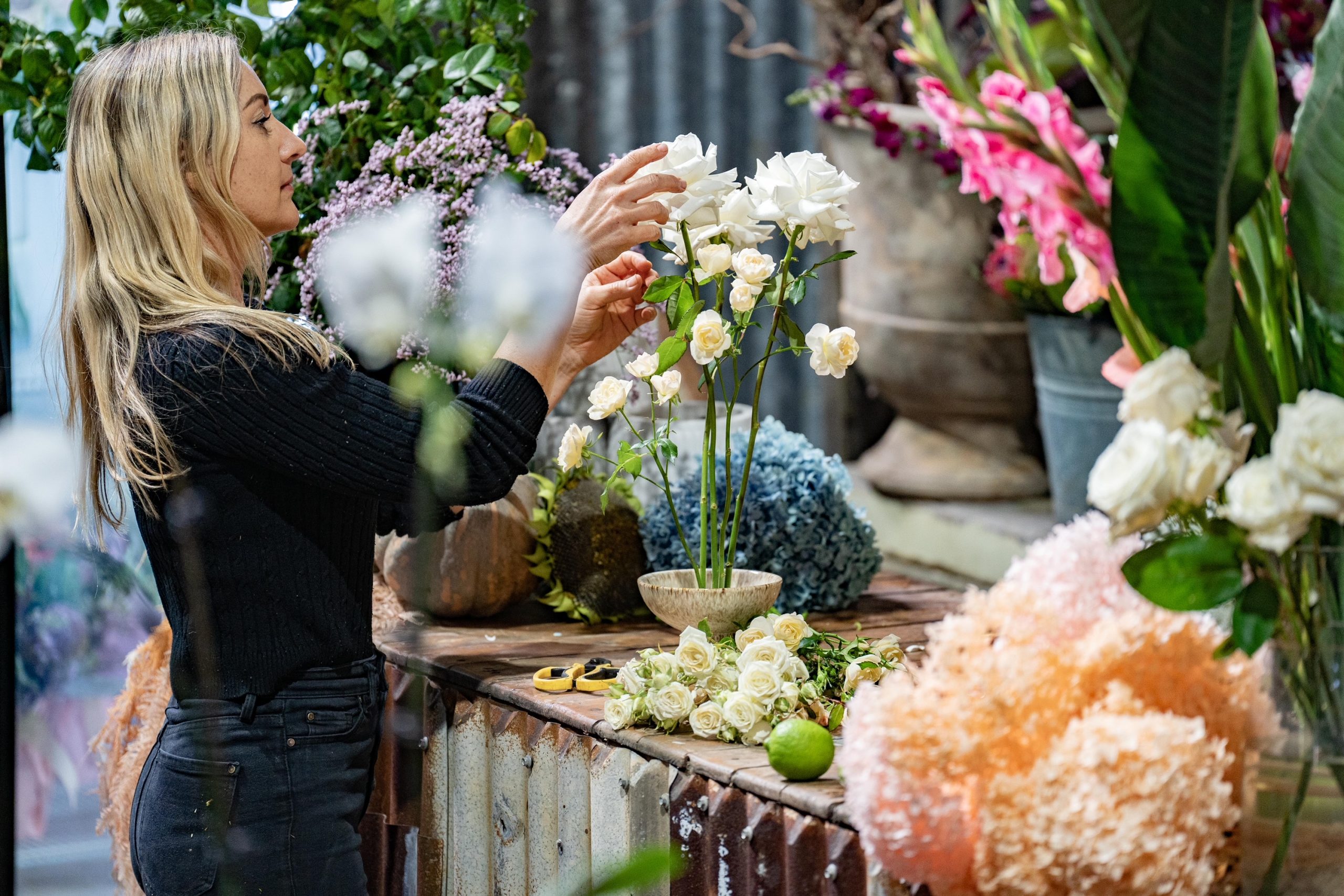
The Shire’s long-established culture of farmers’ markets, along with our proximity to the agricultural sector, make eating locally and seasonally relatively inherent. But even the most urban city-dweller can be cognisant of food miles and choose to support Australian farmers, thanks to our strict country of origin food labelling laws. The same, unfortunately, cannot be said about floristry.
Over half the cut flowers sold in Australia are grown overseas, coming primarily from Malaysia, China, Kenya, Ecuador and Colombia. On top of the impact of worldwide cold-chain transportation and mountains of packaging, Australia’s bio-security requirements mean every single stem must be devitalised with glyphosate to prevent propagation and the spread of diseases. The industry’s impact in their country of origin is also problematic – high water use and chemical runoff, floriculture workers’ exposure to toxins from the unregulated use of fertilisers, pesticides and preservatives, and poor labour
conditions and wages abound.
But here in the fertile Northern Rivers, a new generation of small-scale flower farmers is on the rise, bolstered by the local wedding industry and reflecting the community’s enthusiasm for sustainability. And decidedly female. In a country where women farmers have only been legally recognised since the 1994 census, March’s 52nd Coorabell Flower Show saw a handful of these talented and hardworking women challenge gendered stereotypes and set the Coorabell Hall awash with a sea of colour after an 11-year hiatus.

One of the exhibitors, Caroline Lang, is a fifth-generation farmer on her family property on Myocum Road, where it is hard to miss her giant ‘Pikt’ logo curling across one of the old chicken sheds. Both her grandmothers’ green thumbs ignited her passion for growing flowers, seeing her enrolled in Wollongbar TAFE’s Business, Horticulture & Floristry degree by age 17. Returning to the farm after working overseas, Caroline’s sights were set on growing flowers and starting a local flower market. But the demand for wedding floristry fast became the main event, and the Pikt team of seven now wrangle an average of nine weddings a week during peak season plus their website orders, roadside stall, floral warehouse, corporate services, and supply of readymade bouquets to their Byron sister store, Pikt Posy Co, and Newrybar and Bangalow General Stores.
Incredibly, they manage to grow around half of all their own supplies during spring down during less productive seasons – supplemented by a mix of local flowers, Australian grown flowers from the Gold Coast and Brisbane flower markets, and selective imports, where needed, to satisfy brides’ visions for their big event. Caroline produces dahlias, zinnias, poppies, snapdragons, sweet peas, paper daisies, marigolds, statice, roses, dianthus, alyssum, pansies, violas, cosmos, and foliage like viburnum, tea tree, blue gum, and vines – with plans to expand her fields by another third next season. “If there’s a spare spot, I’m planting it,” she laughs. Sustainability is at the heart of the business, making fertiliser from their own compost and local manures, heavily mulching to reduce water consumption, and she has spent years honing her systems to recycle and re-use as much as possible.
Fellow exhibitor, and one of Caroline’s local suppliers, is Lilli Forrest of Federal Flowers. She is a second-generation certified organic farmer, following in the footsteps of her parents who are pioneers of the local organic movement and longtime Mullum and New Brighton Farmers’ Market stallholders. Originally supplying the family business with edible flowers, lockdown saw Lilli expand her love of gardening and nourishing the soil into a commercial cut flower enterprise, and now grows dahlias, zinnias, calendula, violas, pansies, jonquils, ranunculus, stocks, anemones and native violets – juggled with her day job as a dietitian with HealthShare NSW, implementing food service improvements at hospitals along the east coast. Though she enjoys supplying ready-made bouquets to Santos and Bangalow General Store, she says she is “definitely not a florist” – instead more comfortable in the field, drawing on the knowledge she feels privileged to have passed down to her.
While Caroline and Lilli credit their families as having the most significant influence on their farming journeys, they both make special mention of Friday Hut Road brothers, and champion dahlia growers, Bruce and Steven Wedd, whose mind-blowing display of these magnificent tuberous perennials formed the centrepiece of the Show. Welcoming and generous with their knowledge, the Wedd’s encouragement of anyone wishing to learn more about growing these beauties, native to Mexico and Central America, which thrive in our subtropical climate, is legendary. A growing band of local florists are supporting these women who are putting in the hard yards, including Byron’s Braer, Newrybar’s Our Little Flower Farm, Ewingsdale’s Poppy & Fern, and Bangalow’s Flower Bar. With Pikt’s own Myocum and Byron outlets, and the Newrybar and Bangalow General Stores providing the ultimate convenience, buying ethically, locally and seasonally has never been easier.
Georgia Fox
Feature image Caroline Lang of Pikt Flowers Photo Damian Hyde